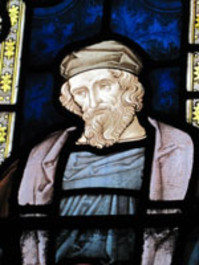Why wouldn’t a preacher want to visit there?

Why wouldn’t a preacher want to visit there? We just returned from spending the Easter weekend in Birmingham, England—preaching at a conference for a group of highly motivated young adults, AdvANCE (Adventist Apologetics Networking Conference on Evangelism). And I was blessed. Not only because of their passion to communicate the everlasting gospel to their extremely secular homeland (one European survey ranked the United Kingdom as the most “godless” nation in Europe). But also because just a few miles up the motorway is the English town of Lutterworth, the final parish of the great 14th century English preacher scholar, John Wycliffe. In that stone and brick sanctuary stands the pulpit containing wooden pieces from the very one Wycliffe thundered from during his pastorate (1374 to 1384). Behind glass are the fragments of the robe this great preacher once wore. And on the platform beside the altar is the still crimson-padded chair he once used.
On the south wall of the high-ceilinged sanctuary is a marble mural carving of Wycliffe, dressed in humble garb, standing in front of the cross, one hand pointing to an open Bible, the other raised to his gathered countrymen. Inscribed are these words: “His labours in the cause of scriptural truth were crowned by one immortal achievement, his translation of the Bible [from the Latin Vulgate] into the English tongue. This mighty work drew on him indeed the bitter hatred of all who were making merchandize of the popular credulity and ignorance: but he found an abundant reward in the blessing of his countrymen, of every rank and age to whom he unfolded the words of eternal life.” Incensed by the mendicant friars who plied their beggarly superstitions across England, Wycliffe, at one time a chaplain to the king, became a champion of the commoners’ right to read the forbidden Holy Scriptures for themselves, in their own tongue. Three times Roman and royal courts attempted to silence the Reformer’s voice. But all three attempts failed. Before his second and mortal stroke would fell him, Wycliffe completed his translation of the Bible. But with no printing press (yet to be invented), its leaves had to be hand-copied by volunteer scribes and secretly passed throughout the country by itinerant preachers (Lollards).
Why bother with this story of an Englishman? “The character of Wycliffe is a testimony to the educating, transforming power of the Holy Scriptures. It was the Bible that made him what he was. The effort to grasp the great truths of revelation imparts freshness and vigor to all the faculties. It expands the mind, sharpens the perceptions, and ripens the judgment. The study of the Bible will ennoble every thought, feeling, and aspiration as no other study can . . . . [and] would give to the world men [and women] of stronger and more active intellect, as well as of nobler principle, than has ever resulted from the ablest training that human philosophy affords” (Great Controversy 94).
Called “the Morning Star of the Reformation” (John Hus and Martin Luther would later draw their inspiration from his ground-breaking reforms), Wycliffe died in his parish at sixty. Enraged they had been unable to publicly silence him, forty years later Rome ordered his bones exhumed, burned to ash and then cast into the nearby Swift River—unwittingly symbolizing the eventual reach Wycliffe’s teaching would have, flowing to every shore on earth. We are his spiritual descendents. Then may the God of Wycliffe raise up a new generation of young, fearless, Bible-saturated defenders of Christ’s faith! That is my prayer.